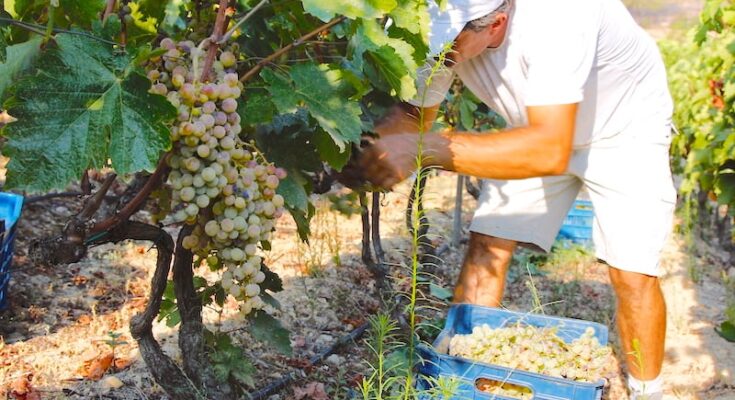
Grape harvesting in late August and September is one of the oldest and most beloved traditions in the Greek countryside. Family, neighbors, and friends all get together to harvest the precious bunches of green and purple pearls which will be pressed to make wine.
It is a ritual that has been repeated in this period since time immemorial in Greece.
Like every ritual which has survived for so long, grape harvesting for winemaking has customs accompanying it which have been passed from one generation to the next. In the past, the grape harvest was seen as an important annual celebration, even taking on a religious aspect. It was by no means just another agricultural task.
Since autumn weather is unpredictable in Greece, and all the chores in the vineyards must be completed fairly quickly before September’s sudden rainstorms—which could ruin that year’s grapes—Greeks have grown accustomed to helping one another during the harvest.
Friends, neighbors, and family gather together and begin working in the vineyards from early in the morning throughout the day while they sing popular songs or playfully tease one another.
Everyone is appointed a specific task: youngsters and women are usually in charge of harvesting the grapes and placing them with care into the large baskets while the strongest men carry and stack the loaded baskets on the trucks.

The grapes are then transported to another, central area, where they are put through another important stage in the winemaking process—the pressing, during which another group of people work together to help create the finished product.
In the past, traditional pressing was accomplished by the stomping of feet after which the juice was then fermented in wooden barrels for a period of three months. Today, in modern facilities, the traditional foot-stomping process has been replaced by more cost-effective (but surely less enjoyable) methods.
Age-old Rituals and Customs
Since the times of ancient Greece, the annual grape harvest has been considered sacred, making harvesting time one of the most joyful and meaningful of all annual celebrations. In those days, young men dressed as women, and holding bunches of grapes, would race from the temple of Dionysus in Athens to the temple of Athena in Faliro.
Many individual grape harvesting customs are particular to each region of Greece which is home to vineyards. The most common is the communal stomping of the grapes inside the presses by the owners of the vines, including neighbors, relatives, and friends, a process called “patitiri.”
In Lefkada, the wives of vineyard owners would first fill baskets with selected grapes, covering them with leaves. Then, they would lick a stone and hide it in the baskets. The grapes would then remain there until winter in a place in nature’s natural refrigerator known only to them.
In Macedonia, it is tradition at the beginning of grape harvest for the vineyard owner’s wife to provide wool aprons to the women who will work in the annual harvest.
In other parts of Greece, winemakers traditionally leave a small area of the grapevines undisturbed, as an offering and thanks to God.

In older days on the island of Ikaria, on July 20th on the feast day of the Prophet Elias, winemakers took bunches of grapes from the first crop to the church of the Prophet Elias to be blessed by the priest so that the rest of the year’s crop would be good.
On Santorini, home of the oldest known vineyards in the entire world, which date back 3,500 years, the annual grape harvest is called “Vendema.” Preparations for this great annual event begin in the first days of August.
The grapes are transported to the winery in Kanava, and depending on their color—either green or purple—they are thrown into separate presses.
In earlier days, anyone who entered the winepress had to withstand the fumes of the must, which were actually extraordinarily unpleasant. The pressing started at night, and those who stomped the grapes had to wash their feet well and dress lightly. They also had to wear scarves on their heads for cleanliness.
The stompers were also known to have tucked basil leaves behind their ears so that they could smell them during the stomping and block out the unpleasant odor of the must. The wine would then be stored for aging in wooden barrels.

On the day that all the foot-stomping ended, there was a great celebration to thank God for the bountiful harvest of that year.
Each September, despite the march of time and the many ways in which harvesting has been modernized, it is a good time to appreciate the age-old importance of the grape harvest in Greece and to ensure that the ancient ways never be forgotten.



